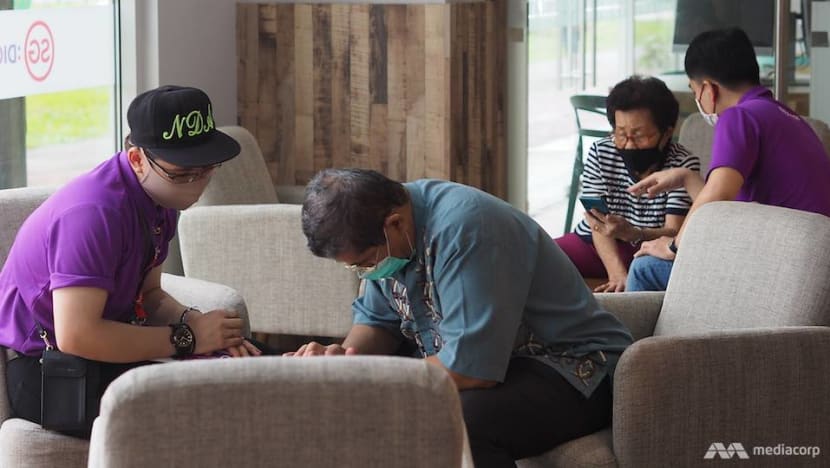Fake news, scams and extremist views: Should we be concerned about what older family members are doing online?

A man using a mobile phone. (File photo: CNA/Jeremy Long)
SINGAPORE: What do you do when an older family member shares fake news with you or when you find out they get their news updates from dubious sources?
Knowing that they might not be as Internet-savvy as you are, how do you make sure they don’t fall prey to scams or buy fake products?
Sarah (not her real name) found out that her father was making xenophobic, racist and nationalistic comments on Facebook. After seeing a notification on his phone, she also found out that he follows very conservative pages and news sites.
The 26-year-old logged into his account and followed more progressive sites and voices to make his Facebook newsfeed more balanced.
Her father also buys items online from sponsored ads on Facebook without researching the product first, and often shares fake news with their family. He spends about one to three hours on the platform each day.
“I don’t think he has the capacity to research and to fact check. Because of that, the only alternative is to trust what he reads online,” she said.
Growing up, millennials like Sarah were constantly warned about the dangers of the Internet.
“Be careful of what you click on. Don’t talk to strangers. You don’t even know what could be out there,” their parents said at the time.
In turn, those who grew up with access to the Internet and social media platforms now have concerns about what their parents might find online – fake news, extremist views, online scams and deals that are too good to be true.
FAKE NEWS
A study by the Institute of Policy Studies (IPS) last year found that more than two-thirds of Singaporeans cannot discern between real and fake news, especially seniors and those living in smaller public flats.
The study’s authors interviewed 2,011 respondents, who were shown a manipulated news article and asked to determine its trustworthiness.
Only 32.5 per cent of respondents correctly said that the article was not trustworthy.
In the study, respondents were divided into four groups – informationally disengaged, informationally overconfident, informationally diffident and informationally savvy.
The first group, which had the lowest use and lowest trust in media and the second-highest rate of confirmation bias, had the highest proportion of seniors. Of this group, 73.1 per cent trusted the manipulated article.
Experts CNA spoke to agreed that older generations seem to have more trouble with verifying information online.
This could be because older generations are more trusting in general, while younger generations are more sceptical, said Associate Professor Edson Tandoc Jr of the Wee Kim Wee School of Communication and Information at the Nanyang Technological University (NTU).
“One thing interesting that we found is that those who trust traditional media were also more likely to believe in fake news … And if you look at the profile of those who trust traditional media, it’s usually the elderly,” he added.
However, that does not mean younger digital natives do not fall prey to fake news.
"I think sometimes (we are) too confident of our skills ... Basically when we compare our perception of our capability to detect fake news with our actual capabilities, sometimes there's a mismatch, where some people overestimate their capability to protect themselves from falsehoods", said Assoc Prof Tandoc.
Older people tend to be more vulnerable to such issues because of a lack of technical skills, he added.
Their social networks are also smaller and less diverse in insights and expertise, said Professor Lim Sun Sun, who teaches media and communication at the Singapore University of Technology and Design.
“If you consider someone in their 50s who's still gainfully employed, the opportunity for them to continue learning on the job … with regard to new technological platforms, to have colleagues to check their knowledge against, verify their uncertainties,” she said, adding that these people would also share information with them via social media platforms.

Elderly people who live with younger family members have access to “warm experts” who help verify information, she said.
This is not the case for those who live alone, and especially those who do not have much of a social network, said Prof Lim. This is a “very fundamental hindrance” to their learning about social media platforms, the Internet and best practices online, she added.
In a 2020 survey, the Cyber Security Agency (CSA) found that the elderly, or those aged 55 and above, had generally lower awareness and adoption of good cyber practices like strong passwords and enabling two-factor authentication.
The survey polled 1,052 Singapore citizens and permanent residents aged 15 years old and above on their general attitudes and behaviours towards cybersecurity practices and incidents.
Although the overall perceived awareness of phishing increased, about one-third of respondents aged 55 and above were unaware of what phishing was, said the agency.
RELYING ON FAMILY OR FRIENDS
Public servant Chris Lim's mother used to often send fake news to her group chats on WhatsApp. The 29-year-old usually corrected her immediately and warned her not to spread such information.
“My mum is the more typical kind of information-illiterate aunty. She’s educated and everything, but she’s the very embarrassing type that will forward fake news on WhatsApp groups,” he told CNA, adding that his mother is happy to be corrected.
When the Protection from Online Falsehoods and Manipulation Act (POFMA) was introduced, she stopped sharing articles from unreliable or alternative sources, said Mr Lim.
“I have scolded her so many times for just forwarding fake news and then correcting her ... because she knows both her sons are educated in an information-literate way, we won’t hesitate to correct her information, and we’ve been proven right on many occasions.”
The opportunity to correct her usually comes up when the family is watching TV at home. When she comments on the news, Mr Lim and his brother correct any inaccurate information that she mentions, he added.
Among the elderly, there is a heavy reliance on peers or groups as a way to verify information, said Assoc Prof Tandoc.
Younger people would verify information by searching on Google and reading traditional media articles, but the elderly would check with their friends and family members about whether something is true, he added.
“They rely a lot on their groups for authentication. Most of the time in these groups, either their friends would confirm, or if people don’t say anything then they also take that as no one is challenging this information,” said Assoc Prof Tandoc, who is also the director of the Centre for Information Integrity and the Internet.
Actually, the elderly share falsehoods not because they already believe in them, but I think they’re hoping someone would vet it for them.
This reliance on one’s peer group and social network is increasing the elderly’s vulnerability to fake news, said Assoc Prof Tandoc.
False information related to the COVID-19 pandemic is also a cause for concern. A 2020 survey by the National Centre for Infectious Diseases found that six in 10 Singaporeans have received fake COVID-19 news on social media, said the Media Literacy Council.
With people spending more time at home and more time online amid the pandemic, their exposure to online risks has increased, said the council in response to CNA's queries.
UNDERSTANDING THE INTERNET
Sarah’s father is not familiar with how algorithms work on social media platforms like Facebook, she said.
“He doesn’t realise that these things are confirming his beliefs. I’m not sure if it’s exacerbated his conservatism over the past few years,” she added.
“I think I’m concerned because it’s wrong, and these things (conservative pages) do push you subtly further right, and that’s not good to have as a father or a person,” she told CNA.
“I did try to get him to follow the more progressive Islamic leaders. But then I realised it didn’t work because when I scrolled through his Facebook again, it was still all these conservative news sites,” she told CNA.
“Then I realised that even though I followed them, he never clicks on them.”
There are studies that have found that most people are actually exposed to a diverse set of perspectives online, said Assoc Prof Tandoc.
“But what I think they're missing is ... I might be exposed to a diverse set of perspectives, but what I will remember or what I will obsess about is the one that confirms my pre-existing beliefs,” he added.
Having grown up in the era of social media, most young people understand how profit-oriented social media models work, said Prof Lim.
They understand that “generating eyeballs” plays a part in how content is generated and pushed to different users, she added.
Fake news, scams and extremist views being disseminated on the Internet are novel situations that are unprecedented for older generations, she added.
“Fake news has been around for centuries. But the way it is now being made so compelling, the way it’s now being shared so widely by virtually anyone – I think that’s unprecedented so that’s novel,” said Prof Lim.
Scams are also novel because they are presented in a sophisticated way with sites that look authentic, she added.
Extremist news sites are similar to fake news as they use “certain modes of framing” to win readers over with their credibility, she added. “Also the fact that they are being algorithmically pushed to you based on previously viewed content, that also is novel.”
“The elderly at the moment are really in quite uncharted waters so I think we can afford to be a bit more forgiving,” said Prof Lim.
“I don’t think any previous generation of elderly faced such a heavy concoction of different kinds of novel content packaged in very alluring ways that are clearly manipulable and that have the weight of big data and algorithmically driven push behind them.”
WHAT CAN BE DONE?
The SG Cyber Safe Seniors Programme was launched in June this year, aimed at reaching out to 50,000 seniors between 2021 and 2023 to raise their awareness of cybersecurity and encourage good cyber hygiene practices, said CSA in its statement.
The programme is “still in its early stages”, but CSA has “observed positive feedback” on the campaign. The agency did not provide figures on the take-up rate for the programme.
Since 2013, the Media Literacy Council has created resources like videos and information sheets to “provide guidance” on issues like online scams, data protection, digital footprints, sharing content responsibly and discerning false information.
It also works with the Singapore Digital Office under the Infocomm Media Development Authority to disseminate tips and resources to seniors.
“Being digital natives, we do see the younger generation guiding their older family members to use mobile phones and computers, and teaching them how to use social media platforms and popular apps such as messaging apps, online shopping apps and digital payment apps,” said CSA.
“In the same vein, they should also teach their older family members how to safeguard their personal or financial information online.”
“For parents it's a bit difficult to accept that your children or people much younger than you are correcting you, or telling you what you should or shouldn't do ... especially in a society like Singapore and in most parts of Asia,” said Assoc Prof Tandoc.
“Seniority is still very strong, and so that's why young people hesitate to correct, and also why older people feel a bit uncomfortable when they are corrected.”
When Sarah advised her father that he should research the information online, he became “quite defensive”, she said.
“I told him you need to Google it, you need to fact check first, this is all fake news. And then the next time, he just won’t listen to that advice,” she added.
She has also tried to speak to her father about his views and what he consumes online – usually when he sends articles or posts to her.
Usually I just ignore. I’ve found that there’s not really a point to having such conversations when he’s not open to change or consider diverse opinions.
It’s important to explain how social media platforms work to drive content towards users, and that content that is most likely to draw eyeballs is most likely to draw an emotional reaction, said Prof Lim.
“So a lot of the fake news videos they receive from friends would actually be manufactured in that field. That’s where it’s important for them to know what are the typical devices out there to get people to share, like and be outraged.”
Gentle nudging and explaining can be helpful, and younger digital natives should be proactive about talking to their older family members about these issues, she added.
“It basically takes explaining how the Internet works in very accessible terms.”

















